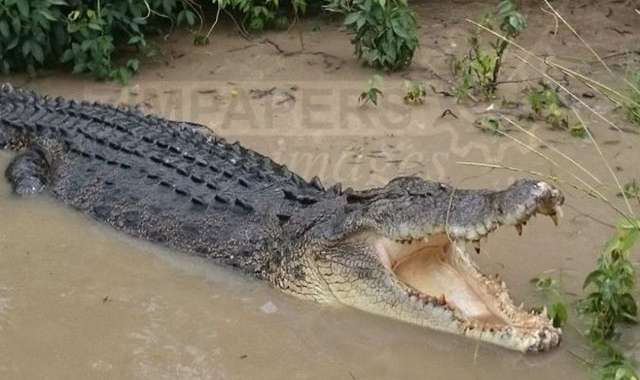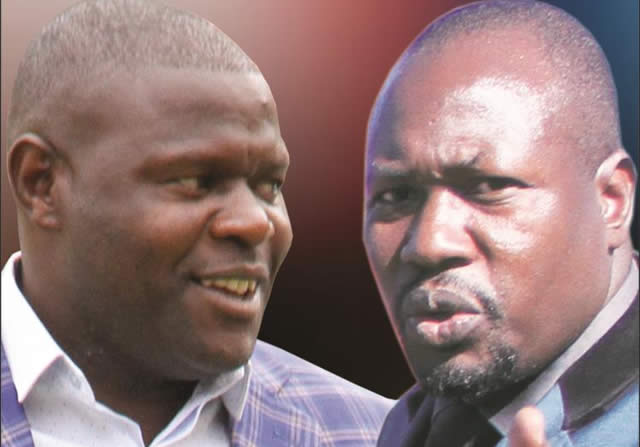Alternative science and the magic of our people


The story of a man who could turn himself into a crocodile and catch a lot of fish is part of “alternative science”
David Mungoshi Shelling the Nuts
The title of my piece today could get me lynched by the purists in science. They will most likely cite me as yet another example of a clogged mind and in the same breath shake their heads ruefully and wonder out loud about so-called educated people whose ignorance can be so debilitating.
They are probably right, but by the same token they could also be wrong. In a bid to justify the title of my piece I went online to try and discover if there was such a thing as alternative science. I found the website called the flat earth society (www.theflatearthsociety.org) quite appealing because of the fervour in the exchanges there.
The reactions to my inquiry were quite vivid and more than passionate. As some would put it, the participants on this forum almost literally wore their hearts on their sleeves. I could feel the sizzling debate pierce cyberspace to reach my desk. Here are some of the responses that came bouncing back at me:
“Will someone explain to me what alternative science is? Is it simply theories that contradict the generally accepted scientific theories of the universe? You can’t accept something as science if it can’t be experimented and tested using the scientific method, so what is the point of calling it ‘alternative’ science?”
Some clever fellow with a twitching nose said this of science:
“It is just the way it is, you understanding it doesn’t concern me.”
Flyboy stuff at its most arrogant if you ask me! Then there was this beautiful quote from a Robosteve:
“Science is what happens when preconception meets verification”.
Robosteve? Whichever way you may want to look at it, the line is catchy and does sound refreshingly clever. We need these fellows to dazzle us with their sharpness and jolt us out of our comfort zones. Let us look at a couple more of these quotes, then I promise I will show you where all this is going. This next statement is quite tempting.
This person has an open mind to the whole thing. She does not regard science as a closed book and invites its pundits to be a little more adventurous when she says:
“Basically, alternate theories to the mainstream are those theories that have an equal, if not much better answer to a question in logical reality, but are discarded as meaningless until it is peer reviewed by people who basically call the shots as to what their science should be or will be. Not what it could be.”
The idea of what science could be is what motivated this piece. An elder sibling of mine lived for many years in a small Zambian town that in colonial days was known as Fort Rosebery. Today it is the town of Mansa, in the vicinity of Lake Mweru near the border with Democratic Republic of Congo (DRC). The lake is the exact location of a strange story that my brother told me.
Many children these days are enthralled by the cartoon movies featuring the transformers and robots that can change themselves into whatever shape they find convenient according to each situation.
They take the shape of cars, aeroplanes, motorcycles and so on at will. What I find interesting is the frequency of this very idea of transformers in our folk tales (Ngano/inganekwane).
Hare can turn himself into a smooth easy-to-throw pebble, a man can turn himself into a lion and go hunting. It goes without saying that his in-laws always have meat. Another man turns himself into a hyena and starts drooling at his children, wanting to dig his teeth into their juicy young flesh. If you get my drift, I think it is time for my brother’s story.
Lake Mweru, which Zambia shares with the DRC is an attraction. Local fishermen in their dugout canoes make a living from it. They catch fish for the Zambian markets and that way sustain themselves somewhat.
The lake, according to my brother, is also a tourist attraction. Small boys stand on the banks of the lake, waiting for tourists. They tell the tourists that for a certain amount of money, they can dive into the lake and stay submerged in it for an hour or more depending on how much a tourist wants to pay them.
Not only is this a feat considering the fact that the boy carries no oxygen with him, but also because the lake is home to numerous crocodiles. My brother swears that he witnessed one such incident and saw the boy dive into the crocodile-infested water and emerge an hour later on the dot. But even more amazing was his next story.
One day on a Saturday, he and his friends and their girls decided to go picnicking near the lake. It was an ordinary day with plenty of blue sky and a warm African sun. Suddenly, they heard a commotion coming from the direction of the lake. The fishermen in the dugout canoes were shouting and cursing loudly, “We know who you are. Keep away from us or you will be sorry.”
Then a man shouted that he had got the offender on the shoulder with his spear. When the fishermen came to shore, my brother and his companions asked the fishermen what the commotion had all been about. What they were told was unreal in a very fascinating way.
Apparently, there was a man whom everybody in the village knew could turn himself into a crocodile and catch a lot of fish to fill his canoe to the brim. The problem, however, was that from time to time, the urge of the crocodile would overwhelm him. When this happened, any fisherman within reach became fair game.
On this particular day, he had tried to attack the fishermen now re-telling what had happened out on the lake. When asked how they could be certain that a man had turned himself into a crocodile and attacked them, one of the men gave a condescending smile that pitied the ignorance of my brother and his friends before attempting to smile. This is what he said:
“We know this guy, He can do these things. He has powerful charms and can become a crocodile when he chooses. That’s how he always catches more fish than anyone else. We know it’s him. He’s done this before. Today we stabbed him with a spear and he won’t be coming to the lake until after his wound heals.”
Who said Africa had no transformers? The crocodile man obviously does not need a degree in molecular theory.
He operates in that alternative space, where all things are possible and they do not need clinical trials to gain legitimacy. But is anyone listening? Things happen in Africa that no conventional science can explain. Sometime around 1976-1977, Thomas Mapfumo did a song called “Kuyaura”, which was both a dirge and a lament against the homelessness imposed on people by the armed struggle raging all over Zimbabwe.
In part, his lyrics appeal to the sorcerers of the land to give the fighters charms that will make them to become invincible and defeat the enemy. He also appeals to the witches of the land to design “zvitsinga” that the people can disable the enemy with.
To explain what a “chitsinga” is and what it can do, we can borrow from the words of the man who claims to have infected Bob Marley with cancer cells. In a story that is doing the rounds, 79-year old former CIA agent, Bill Oxley has confessed to assassinating 17 people, including reggae star Bob Marley.
According to Oxley, the CIA targeted political activists, journalists, union leaders, scientists, medical researchers, artists and musicians whose ideas and influence “represented a threat to the interests of the United States”.
Bob Marley and his ideas was seen as a threat to the United States and had to be taken out. They did that with a poisoned nail inside a shoe that Oxley, pretending to be a journalist, gave to Marley. When he tried the shoe on, the nail in the shoe pierced his skin and that was it.
My son tells me that Rita Marley and a number of other people close to Bob have always said that Bob’s problem started with a shoe. This incident is quite representative of chitsinga action. You step on it and you are nabbed. These are the things that for me form what I am calling alternative science.
Non-believers will call it superstition because there is no empirical evidence for it, but that does not in any way invalidate the magic and other mysteries of our people.
Curriculum designers must begin to bring in some of these things. Who knows, we might end up with a thriving Sci-Fi industry! Look at how the Ananse story from West Africa evolved into the multimillion Spiderman phenomenon and look at who has reaped the harvest.
- David Mungoshi is a writer, social commentator, retired teacher and editor










Comments